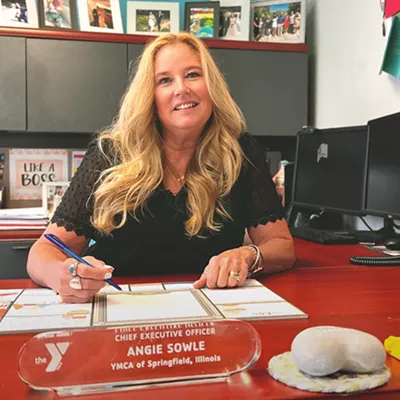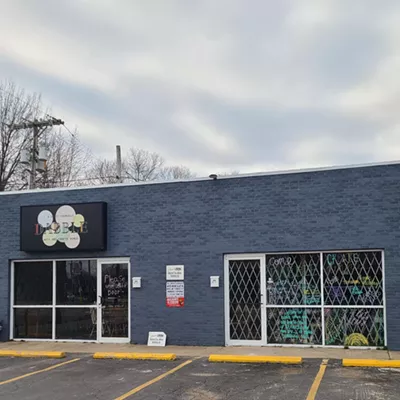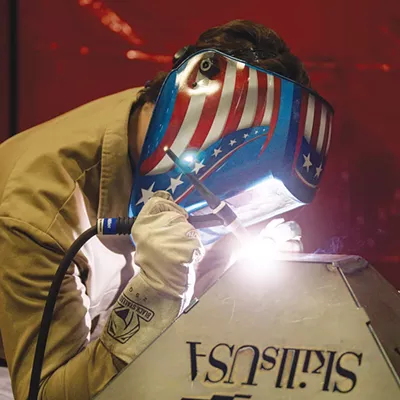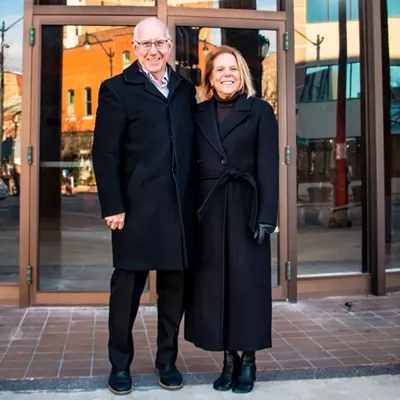Illinois’ inmates make everything from grills to boxer shorts in a program designed to train offenders for post-release work By Zach Baliva
If you received glasses in Illinois through Medicaid, a prison inmate fabricated your eyewear at the Dixon Correctional Facility. And that’s not all. More than 900 offenders, managed by 120 state employees in nearly 20 Illinois facilities work in a volunteer program to produce about 1,000 products available through Illinois Correctional Industries.
Jen Aholt, chief executive officer of ICI, runs the program, created by legislative mandate of the Illinois General Assembly to produce products inside the state’s correctional centers to help rehabilitate incarcerated individuals. She says the program has many benefits, from lowering recidivism rates to saving taxpayer dollars. According to ICI’s 2014 annual report, an increase in Earned Good Conduct Credit days attributed to the program saved taxpayers $320,980 that year. The self-funded program does not receive tax dollars and exists solely on the sale of the goods and services it provides to state agencies, political units, nonprofits, and public institutions.
“The program is on a voluntary basis,” says Aholt. “There is not a mandate to participate.” In fact, there is an application and interview process. It is also important to note that participating inmates are in fact paid. “Many people think we do not pay the inmates,” she says. “In fiscal year 2014 our inmate payroll was $1,844,198.”
Until 1976, each prison operated independent programs, but legislation passed that year unified the program that now trains inmates to produce furniture, train and groom dogs, make food and manufacture garments. Inmates at a Danville facility design graphics and wrap Department of Corrections and state vehicles. Participants must have a high school diploma or GED and meet certain behavioral standards to qualify. “We are not only teaching offenders a trade or a skill but also working with them on soft skills like communication and teamwork. Those are the things that are a big detriment to people who leave prison and exit into the work environment for the first time, so this program sets them up for success upon release,” says Aholt.
ICI is now partnering with the Department of Labor to legitimize its training program through the issuance of credentials and certificates. “We’re also working with companies that are similar so they can see how strong our training is, so they’ll be ready to hire a pre-trained staff,” Aholt explains. The program’s optical lab in Dixon is one of Aholt’s success stories. Field practitioners must obtain an industry certification by passing an American Board of Opticianry exam. Thirty-five of ICI’s 95 inmates in the Dixon lab will be ABO certified this year. According to Aholt, eyeglass companies and clinics in the surrounding area are already starting to hire inmates prior to their release.
Critics of this and similar programs contend that each prisoner involved accounts for one job lost on the outside, and correctional industries have an unfair competitive advantage since they don’t pay standard wages. In response, Aholt says “Only .02 percent of our sales are to non-government and nonprofits. We are not out competing for any private industry’s market share. We hire union staff to oversee training programs that teach our fellow U.S. citizens a trade, and these people are moving back into our communities better prepared and able to be taxpayers and providers to their families.”
Although ICI’s central office is in Springfield (and Aholt is working to hire post-release clerks for that office) the closest operation is in Lincoln, where the program operates a sign and chair shop. The same city’s female facility runs dog training and recycling programs. Another facility offers dog grooming, and while it may seem like an unusual service, Aholt says managers picked the service because it provides a low-cost entrepreneurial opportunity for inmates upon their release.
While ICI gives participants skills, it gives them something else – hope. “We’re not competition, we’re a training program. We are training a segment of the Illinois workforce that has been undertrained,” says Aholt. “Inmates who have gone through this program know they can look forward to a job the day they get out of prison. They will have something for their resume, skills to back up that experience and the work ethic to keep the job.”
This readied and trained workforce is being acted upon by one of our Illinois businesses seeing significant growth, according to Aholt. “Midwest Fiber has traveled to each of ICI’s recycling centers to discuss career opportunities in ‘green collar jobs’ as well as to perform mock interviews to better prepare the inmate trainees for such opportunities,” she says. On June 19, both Midwest Fiber and ICI will receive the Outstanding Public/Private Partnership award from the Illinois Recycling Association.
Although Aholt says recidivism rates aren’t available and the 2014 Annual Report concurs, citing database issues from 2005, a correctional industry program similar to ICI in Indiana boasts a rate of 24 percent compared to the Illinois Department of Corrections rate of 48 percent. Aholt says that she’s asked for an employment study to determine how many former ICI inmate participants actually obtained gainful employment upon their release. Results are pending, but she expects that when recidivism rates are again available they will show that ICI has a lower number than the statewide average. “I can tell you that with confidence,” she says.
Zach Baliva is a media producer and writer living in Springfield.


















